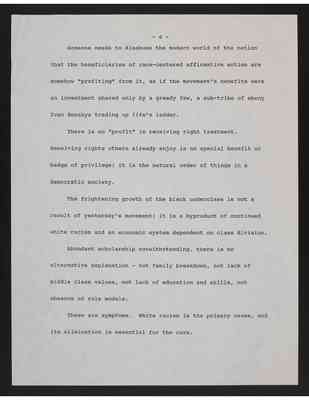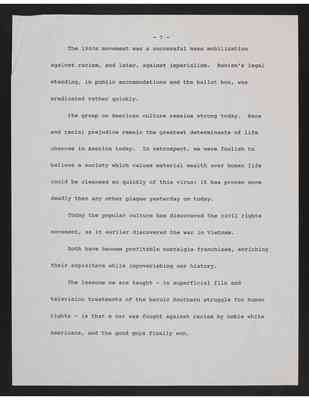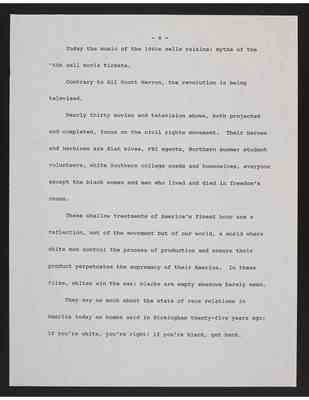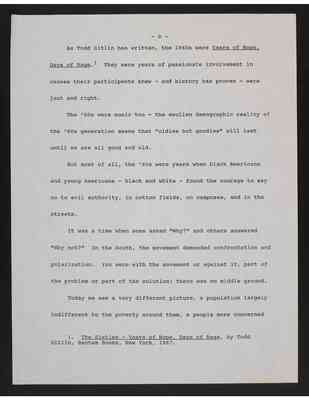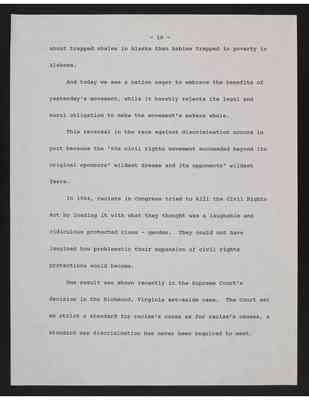Pages
6
- 6 -
Someone needs to disabuse the modern world of the notion that the beneficiaries of race-centered affirmative action are somehow "profiting" from it, as if the movement's benefits were an investment shared only by a greedy few, a sub-tribe of ebony Ivan Boeskys trading up life's ladder.
There is no "profit" in receiving right treatment. Receiving rights others already enjoy is no special benefit or badge of privilege; it is the naturla order of things in a democratic society.
The frightening growth of the black underclass is not a result of yesterday's movement; it is a byproduct of continued white racism and an economic system dependent on class division.
Abundant scholarship notwithstanding, there is no alternative explanation - not family breakdown, not lack of middle class values, not lack of education and skills, not absence of role models.
These are symptoms. White racisom is the primary cause, and its elimination is essential for the cure.
7
- 7 -
The 1960s movement was a successful mass mobilization against racism, and later, against imperialism. Racism's legal standing, in public accommodations and the ballot box, was eradicated rather quickly.
Its grasp on American culture remains strong today. Race and racial prejudice remain the greatest determinants of life chances in America today. In retrospect, we were foolish to believe a society which values material wealth over human life could be cleansed so quickly of this virus; it has proven more deadly than any other plague yesterday on today.
Today the popular culture has discovered the civil rights movement, as it earlier discovered the war in Vietnam.
Both have become profitable nostalgia franchises, enriching their exploiters while impoverishing our history.
The lessons we are taught - in superficial film and television treatments of the heroic Southern struggle for human rights - is that a war was fought against racism by noble white Americans, and the good guys finally won.
8
- 8 -
Today the music of the 1960s sells raisins; myths of the 60s sell movie tickets.
Contrary to Gil Scott Herron, the revolution is being televised.
Nearly thirty movies and television shows, both projected and completed, focus on the civil rights movement. Their heroes and heroines are Klan wives, FBI agents, Northern summer student volunteers, white Southern college coeds and housewives, everyone except the black women and men who lived and died in freedom's cause.
These shallow treatments of America's finest hour are a reflection, not of the movement but of our world, a world where white men control the process of production and ensure their product perpetuates the supremacy of their America. In these films, whites win the war; blacks are empty shadows barely seen.
They say as much about the state of race relations in America today as bombs said in Birmingham twenty-five years ago; if you're white, you're right; if you're black, get back.
9
- 9 -
As Todd Gitlin has written, the 1960s were Years of Hope, Days of Rage.1 They were years of passionate involvement in causes their participants knew - and history has proven - were just and right.
The '60s were music too - the swollen demographic reality of the '60s generation means that "oldies but goodies" will last until we are all good and old.
But most of all, the '60s were years when black Americans and young Americans - black and white - found the courage to say no to evil authority, in cotton fields, on campuses, and in the streets.
It was a time when some asked "Why?" and others answered "Why not?" In the South, the movement demanded confrontation and polarization. You were with the movement or against it, part of the problem or part of the solution; there was no middle ground.
Today we see a very different picture, a population largely indifferent to the poverty around them, a people more concerned
1. The Sixties - Years of Hope, Days of Rage, by Todd Gitlin, Bantam Books, New York, 1987.
10
- 10 -
about trapped whales in Alaska than babies trapped in poverty in Alabama.
And today we see a nation eager to embrace the benefits of yesterday's movement, while it harshly rejects its legal and moral obligation to amek the movement's makers whole.
This reversal in the race against discrimination occurs in part because the '60s civil rights movement succeeded beyond its original sponsors' wildest dreams and its opponents' wildest fears.
In 1964, racists in Congress tried to kill the Civil Rights Act by loading it with what they thought was a laughable and ridiculous protected class - gender. They could not have imagined how problematic their expansion of civil rights protections would become.
One result was show recently in the Supreme Court's decision in the Richmond, Virginia set-aside case. The Court set as strict a standard for racism's cures as for racism's causes, a standard sex discrimination has never been required to meet.
